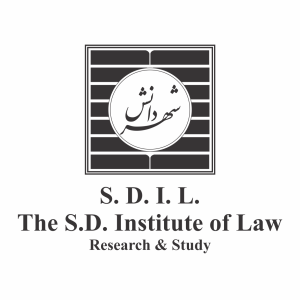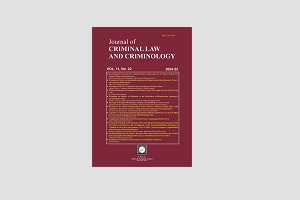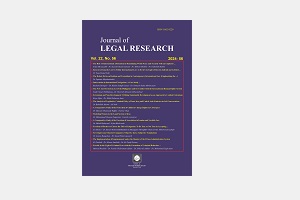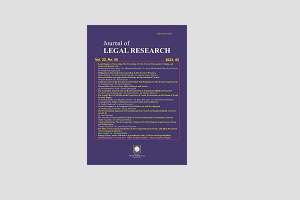Journal of
Legal Research
Number 15
Vol. VIII No. 1
Spring – Summer 2009
Managing Editor: Vahid Eshtiagh
Editor-in-Chief: Seyyed Ghasem Zamani
CONTENTS
Articles
Publishing Picture of Accused in Newspapers: A Legal Reflection
Ali Khaleghi (Ph.D.)
Evolution of Non-Proliferation Rule: Acceptable or Unacceptable Proliferation
Ali Reza Ebrahimgol
The Nature and Foundation of Carriers Liability: A Comparative Study of the International Conventions on Carriage and the Iranian Law
Feizollah Jafari (Ph.D.)
The Independence of Judges under the Iranian Judiciary System
Ali Dehghani
Prosecution of War Crimes Committed in Gaza and the Goldstone Report: Universal Jurisdiction
Seyed Ghasem Zamani (Ph.D.)
An Introduction to Non-Historical Approach to Constitutional Law in Iran
Seyed Nasser Soltani
Scope of the Analogical Reasoning: A Critical Appraisal of the Fighi Methodology of Penal Analogy
Hossein Simaee (Ph.D.)
Ratification of Juridical Assistance Treaties in Iranian Legal Order Regarding International Legal Order: Confrontation or Compatibility?
Mohammad Ghorbanpour & Soheyla Hamed
A Comparative Review of Property in Islamic Law and Western Law
Mohammad Reza Vijeh (Ph.D.)
Implementation of International Obligations under the Judiciary System of Iran: Limitations and Potentialities
Hamid Hashemi
Special Issue: Status and Function of NGO’s in National and International Legal Systems
The Legal Status of International NGOs in International Law and in the Iranian Legal System
Seyed Yaser Ziaee & Seyed Hadi Pazhouman
The Mutual Interactions of NGOs and WTO
Aramesh Shahbazi
Impacts of Non-Governmental Organizations on Domestic Law: The Case of “FIFA”
Amir Maghami
Developments in United Nations Relations Regarding Mutual Interactions with Non-Governmental Organizations
Pouria Askari
The Role of NGOs in Legal Protection of Persons with Disability: With Special Reference to the Case of Nicola Perruche
Hasan Moradzadeh (Ph.D.)
The Obstacles of Establishment and Efficiency of NGOs in Iran 15
Tayebeh Vaezi & Mohsen Sadeghi (Ph.D.)
Critique and Presentation
The Cyber Crime Act: A critical evaluation of its innovations and shortcomings
Mehrdad Rayejian Asli (Ph.D.)
Restraining Academicians’ Right to Access to Court by the Supreme Council of Cultural Revolution!?
Keyvan Sedaghati & Zohreh Amir Aftabi
One Step Back, Few Steps Forward: The Case of Contaminated Bloods Revisited
Ali Saberi (Ph.D.)
Articles
Publishing Picture of Accused in Newspapers:
A Legal Reflection
Ali Khaleghi (Ph.D.)
Abstract:
This article examines legality of some judicial authorities’ decision to publish uncovered picture of an accused in newspapers. The situation at first glance, may look like a legal vacuum, since no explicit legislation bans or allows the act. We shall, thus, first, study some legal reasons which can be offered to back the permissibility. Yet, I shall argue for the ban taking into account some of our recognized legal principles, as well as implicit indication of a particular piece of the Criminal Procedural Act. This article has, however, admitted the fact the addressees of the ban are judicial authorities. The parliament may, however, enact particular piece of legislation which -in certain circumstances and under certain conditions- enables the judicial authorities to do so.
Keywords: Publication of Accused Picture, Newspaper, Media, Presumption of Innocent, Privacy, Confidentiality of the Preliminary Investigations, Competence of Public Authorities, Criminal Procedure
Evolution of Non-Proliferation Rule:
Acceptable or Unacceptable Proliferation
Ali Reza Ebrahimgol
Abstract:
Discovery and application of atom’s power was the beginning of a new era of human life, a marvelous power susceptible to both destruction and development. The nature of society of sovereign states which assume its only mission self-preservation and realization of national interests and hence anxiety of applying this power as a means of war and destruction amounted to limitation of its military uses while recognizing right to its peaceful uses in 1968 Nuclear Non-Proliferation Treaty (NPT). By this treaty only 5 countries have been recognized as nuclear state and proliferation of nuclear weapons has been declared absolutely unacceptable. The nature of this treaty and its relevance to maintenance of international peace and security, lack of an interpretive organ in the treaty and changes in international nuclear environment have led to various and, sometimes, conflicting attitudes in implementation of that treaty, attitudes which arise from confusion between institutional international law and relational international law. Thus by understanding law as a process, some speak no longer about non-proliferation but acceptable and unacceptable proliferation.
Keywords: Non-Proliferation, Institutional International Law, Relational International Law, Acceptable Proliferation, Unacceptable Proliferation, Right to Peaceful Uses of Nuclear Energy
The Nature and Foundation of Carriers Liability:
A Comparative Study of the International Conventions on Carriage and the Iranian Law
Feizollah Jafari (Ph.D.)
Abstract:
Carrier liability is one of important subject in the context of carriage laws. Due to existence of contract of carriage between the sender and carrier, nature of their liabilities should be treated as contractual and, thus, the basis of their liability should be determined on the same ground, too. That is to say, the basis of the carrier liabilities differs according to obligation that the law and contract impose upon them. This paper undertakes to discuss the nature and foundation of this liability under the International Convention on Carriage and the related laws of Iran.
Keywords: Carriage, Liability, International Convention, Iranian Law
The Independence of Judges
under the Iranian Judiciary System
Ali Dehghani
Abstract:
The independence of judges beside their impartiality is significant guarantees in insuring a fair trial. The independence of judges calls for their full liberty to issue a judgment taking into account only the relevant facts and laws, without being under inappropriate intervention and pressures from other governmental or non-governmental agencies. It requires a system in which selection, employment and promotion of the judges are all designed to secure their full job security. A careful examination of the relevant laws and regulations would reveal the fact that despite one century of the legislative history, the independence of the judges has not been appreciated as such.
Keywords: The Independence of Judges, Job Security, Judicial Interpretation
Prosecution of War Crimes Committed in Gaza
and the Goldstone Report: Universal Jurisdiction
Seyed Ghasem Zamani (Ph.D.)
Abstract:
On 3 April 2009, the President of the Human Rights Council established the United Nations Fact Finding Mission on the Gaza Conflict with the mandate “to investigate all violations of international human rights and international humanitarian law; violations that might have been committed at any time in the context of the military operations conducted in Gaza from 27 December 2008 and 18 January 2009, whether before, during or after.” From the facts gathered, the Mission found that the following grave breaches of the Fourth Geneva Convention were committed by the Israeli armed forces in Gaza: willful killing, torture or inhuman treatment, willfully causing great suffering or serious injury to body or health, and extensive destruction of properties, destructions not justified by military necessity and carried out unlawfully and wantonly. As grave breaches these acts give rise to individual criminal responsibility.
The Mission recommends that the States parties to the Geneva Conventions of 1949 should start criminal investigations in national courts, using universal jurisdiction, where there is sufficient evidence of the commission of grave breaches of the Geneva Conventions of 1949. Where so warranted following investigation, alleged perpetrators should be arrested and prosecuted in accordance with internationally recognized standards of justice.
Keywords: Goldstone Report, Gaza, Universal Jurisdiction, War Crimes, Impunity, Human Rights, Humanitarian Law
An Introduction to Non-Historical
Approach to Constitutional Law in Iran
Seyed Nasser Soltani
Abstract:
The lack of historical awareness limited our understanding of the constitutional movement to a short period. Combating tyranny started much earlier than 13th of Mordad 1285 (1906). The absence of the historical consciousness veiled this awareness. One of the consequences of this concept of history emerged in our approach to Constitutional Law. The absence of the historical consciousness detached the constitutional law from its roots, i.e. the history of the Constitutionalism in Iran. The consequence of this separation of the Constitutional law and the history of constitutionalism was that the study of the constitutional systems of “foreign countries” rather than the “esprit du peuple/volksgeist” was brought into focus in Constitutional Law. In this paper, I will argue that we were not right on recognition of the main problematic issues in Iranian Constitutional Law. The studies in the Constitutional Law were not theoretically commenced as “the conditions of introducing the idea of Constitutionalism in Iran”. I will explain how the escape from the recognition of the consensual historical elements of the fundamental law delayed achieving a constitution based on the “esprit du peuple/volksgeist” and also on the consensus.
The history of Constitutionalism is the point from which the modern concepts of Public Law in Iran emerged. The search for the content of the concepts and their conceptions among the earlier and later constitutionalists is the spotlight in the history of the idea of Public Law in Iran. Nowadays, after a century and a half of the advent of these concepts in Iran, it is time to observe them from the viewpoint of the metamorphosis of the concepts. These concepts emerged with a continuous or ruptured link to the past, with the introduction of the idea of instrument of government and imposing limits on its absolute power. In this article, we will demonstrate the necessity of studying history of the Constitutionalism in Iran for true understanding and creation of Public Law. In Addition, in order to show the emphatic necessity of the constitutional history approach to the legacy of constitutionalism, I will show the capability of the concepts of the Constitutional Law in lifting the veil of obscurity surrounding the constitutionalists’ efforts, which the concepts of the history of constitutionalism cannot serve to decode them.
Keywords: The history of Constitutional Law, Historical Approach to Constitutional Law, History of Constitutionalism, Constitutional history
Scope of the Analogical Reasoning: A Critical
Appraisal of the Fighi Methodology of Penal Analogy
Hossein Simaee (Ph.D.)
Abstract:
Although discussion of the scope of the analogy seems to be a logical offshoot of its validity, the main concern of this article is to open a rather different window for the validity of the analogical reasoning via examining the scope of the analogy and arguing for reasonability of certain legal and fighi propositions. Critical evaluation of an extreme textualism, explaining causality and identification of the cause would enable us to appreciate the logical status of analogical reasoning. The fighi approach to validity of the analogy in penal issues has been criticized through illustrating its methodological inconsistency. A major contribution of this article is to offer a consistence theory of analogy compatible with logic of fiqh. At the end, by deploying a comparative study of the analogy under the Iranian and the England’s systems the writer has demonstrated many similarities of these two different systems.
Keywords: Analogy, Cause, Reason, Text, Hudood, Punishment
Ratification of Juridical Assistance
Treaties in Iranian Legal Order Regarding
International Legal Order: Confrontation or Compatibility?
Mohammad Ghorbanpour & Soheyla Hamed
Abstract:
The increasing improvement of the States’ relations calls for eliminating certain obstacles, such as hosting criminals escaping from justice, confrontation of which necessitates countries friendly co-operation. Cooperation in this field results in ratification of Legal Assistance Treaties. These treaties, when concluded, are governed by some principles of the international criminal law and public international law. Yet, due to particular nature of the Islamic Republic of Iran, in which Guardian Council plays significant role in interpreting treaties according to the Shari`ah, certain obstacles seem to emerge in concluding such treaties. In fact, the interpretations of the Guardian’s Council reject these principles, yet the necessities of the judicial cooperation between Iran and other countries requires the confirmation of enactments of the Parliament by the Expediency Council. The role of the Guardian Council in objecting to some treaties and accepting others with the same content is noticeable.
Keywords: Judicial Assistance Treaties, Letters Rogatory, Transfer of Sentenced Persons, Transfer of Proceedings, Extradition, Guardian Council, Expediency Council
A Comparative Review
of Property in Islamic Law and Western Law
Mohammad Reza Vijeh (Ph.D.)
Abstract:
“Property”, as one of the most important legal institutions, has had a great impact on the variety of different legal systems and cultures. In Shiite jurisprudence, many of the jurisprudential rules are the guarantees for this issue, and this support in the West legal matters goes back to the Roman legal age. A view on the variety of “property” in these two legal systems shows that the principles of this issue are created in two completely different systems, and the cited difference has affected the supporting necessities as well. Actually, in the Islamic jurisprudence, “property” is referred to the legal situation, while in the Western legal systems, this referred to the subjective right. Considering the inefficiency of the legal situation sense, it seems that changing the principle of property to the personal right is unavoidable; the issue which is not in contrast with the jurisprudential principles. And, it also completes its changing chain.
Keywords: Property, Legal Situation, Subjective Rights, Domination, Appropriation
Implementation of International Obligations under the Judiciary System of Iran: Limitations and Potentialities
Hamid Hashemi
Abstract:
International law is an independent legal system which its norms must be implemented by a judge beside domestic laws. Expansion of the international law led to the explanation of the issues governed by international rules. Article 9 of Iran’s Civil Code considers obligations created by sources of international law as equal to that of domestic law, and thus judges are obliged to apply them in their court. Iranian judges, therefore, must identify an appropriate applicable norm (be it domestic or international) and issue their verdict accordingly. In addition to the treaty obligations, the Civil Code of Iran enables a judge to apply obligations created by other international sources. Article 8 of the Civil Code in conformity with Article 9 enables an Iranian judge to play a judicial international role in penal cases without the need to refer to a particular domestic law, provided they observe the legality rule.
Keywords: Domestic/International Law Relation, Implementation of International Law, International Obligations, Sources of International Law, Universal Jurisdiction, Article 9 of the Civil Code, Article 8 of the Penal Code
The Legal Status of International NGOs
in International Law and in the Iranian Legal System
Seyed Yaser Ziaee & Seyed Hadi Pazhouman
Abstract:
International law pays special attention to certain rules and procedures relating to legal status of international non-governmental organizations. Having presumed the necessity of conformity of domestic laws with international law, this paper evaluates degree of compatibility of the Iranian laws relating to legal status of international non-governmental organizations with that of the international law. This study deals with four aspects of non-governmental organizations: definition and nature, typology, legal status and their financial resources. In this regard we attempted to shed some lights on ambiguous points existing in both international norms and the Iranian legal system relating to such organizations and, hence, offer certain suggestions in this concern.
Keywords: Non-Governmental Organization, International Non-Governmental Organization, International Law, Iran Legal System, International Legal Personality
The Mutual Interactions of NGOs and WTO
Aramesh Shahbazi
Abstract:
In this article, we will examine the nature and the extent of the involvement of nongovernmental organizations in the activities of the World Trade Organization. We look at the arguments for and against NGOs involvement in WTO activities and discuss the legal basis for the involvement of NGOs in WTO activities and the various forms of involvement provided for it. We will compare the position of NGOs in the WTO with their position in other international organizations, in particular, the United Nations. Subsequently, this article explores the practice of WTO engagement with NGOs, and finally, it examines and compares the rules and procedures of the WTO and the United Nations for the selection of the NGOs with which to engage. In this regard, Justified concerns about the legitimacy, accountability, and politics of NGOs could be eliminated, or at least mitigated, by introducing a system of accreditation in the WTO. While NGO involvement in the WTO definitely has its limits and its scopes, the involvement of NGOs in other international organizations, in particular, the United Nations suggests that these limits have not been achieved yet.
Keywords: World Trade Organization, Non Governmental Organizations, Dispute Settlement Mechanism, NGO’s Involvements, Amicus Curiae
Impacts of Non-Governmental Organizations
on Domestic Law: The Case of “FIFA”
Amir Maghami
Abstract:
Extensive participation of Non-governmental Organizations (NGOs) in various international activities leads to unavoidable conflicts as to their interests and States interests. FIFA’s decisions on suspension and expulsion of some members, sometimes is interpreted as intervention in States internal affairs. A case in point is FIFA’s decision to force Iranian government to make revision to Statute of Iranian Football Federation that despite its conformity with Iranian laws was contrary to the FIFA standards. FIFA suspended the federation because the statute legalized intervention of the government in the federation affairs as an NGO. The dismissal of the president of national football federation by the president of the Physical Education Organization and the vice-President has been an obvious example of the intervention. Various political, social and economic consequences of this suspension caused the acceptance of FIFA’s provisions by Iran, and thus making revision to the statute. But the important question as to the behavior of FIFA is whether or not it is an international law-maker? It seems that FIFA’s action is based on non-intervention of governments in football. Therefore FIFA’s attempts should not be considered as intervention in the affairs of governments. The action of FIFA is an effort of a non-governmental organization for “return to usual state” by resorting to public opinion. FIFA can not accept intervention of States in the internal affairs of NGOs. In the author’s this should not be interpreted as opinion an intervention, political act or international law-making by FIFA. However FIFA’s actions show the power of a non-governmental organization toward harmonization.
Keywords: FIFA, (Iranian) Football Federation, (Iranian) Physical Education Organization, the Statute, International Non-Governmental Organization
Developments in United Nations Relations Regarding
Mutual Interactions with Non-Governmental Organizations
Pouria Askari
Abstract:
NGOs have been active in the United Nations since its founding. They interact with the UN Secretariat, programmes, funds and agencies and they consult with the member states. In 1996, ECOSOC reviewed and expanded its arrangements for consultation with NGOs and recommended that the General Assembly examine the question of the “participation of NGOs in all areas of work of the UN”. The role and significance of NGOs in new era and the results of the ECOSOC recommendation are to be discussed in the present article.
Keywords: Non-Governmental Organizations, Civil Society Organizations, United Nations.
The Role of NGOs in Legal Protection
of Persons with Disability: With Special
Reference to the Case of Nicola Perruche
Hasan Moradzadeh (Ph.D.)
Abstract:
Neither intervention nor the impact of the NGOs in political, social, legal and cultural fields of the developed societies can be denied. NGOs active in supporting persons with disability are not exception to this. Such NGOs may offer their support by playing an active role in the legislative process, as well judiciary proceedings. The case of Nicola Perruche- a child born with disability- is one of the most controversial cases which led to the decision of “Cour de Cassation, Assemblée Plénière” of France, as well as a French piece of legislation. “Cour de Cassation, Assemblée Plénière” considered him to be entitled to compensation. The decision has not been welcomed by the related NGOs, and, consequently, the French legislator consulted the NGOs to pass a piece of legislation offsetting decision of the “Cour de Cassation, Assemblée Plénière’s” decision. Unhappy with elimination of the doctors’ civil liability and transferring it to the social bodies by that law, once again NGOs lobbied for amendment of the law, the result of which was the enactment of 2005 law. Careful examination of the case and subsequent legal events would offer valuable lessons to the Iranian judiciary bodies, the legislator, as well as the Iranian NGOs active in the field.
Keywords: NGOs, Persons with Disability, Legal Protection, Legislation, Judicial decision, Nicola Perruche’ case
The Obstacles
of Establishment and Efficiency of NGOs in Iran
Tayebeh Vaezi & Mohsen Sadeghi (Ph.D.)
Abstract:
NGOs, as organizations independent of governments and their controls, are established on the basis of innovation, free will and self-motivated cooperation of individuals whose purposes are benevolent. Today, the NGOs play a considerable supportive role in different fields such as legal, political, economic, environmental, cultural, so that some scholars interpret them as the alert conscience of society or an instrument for the adjustment of the position of people (as weaker party) in the face of the government (as stronger party). However, there exist numerous legal or non legal barriers for either establishing NGOs or their efficiency when they have been established. This article, first, examines these obstacles and, then, offers some practical suggestions for their removal.
Keywords: Non-Governmental Organizations (NGOs), Legal Obstacles, Non Legal Obstacles, Iran





